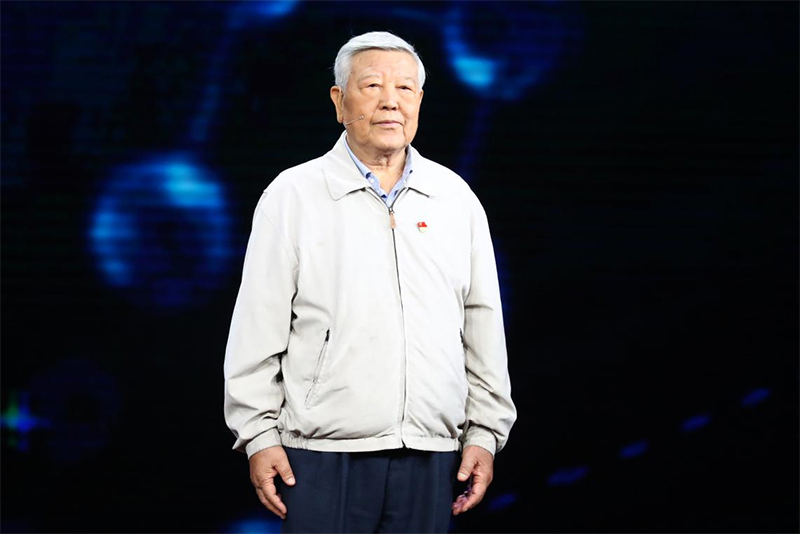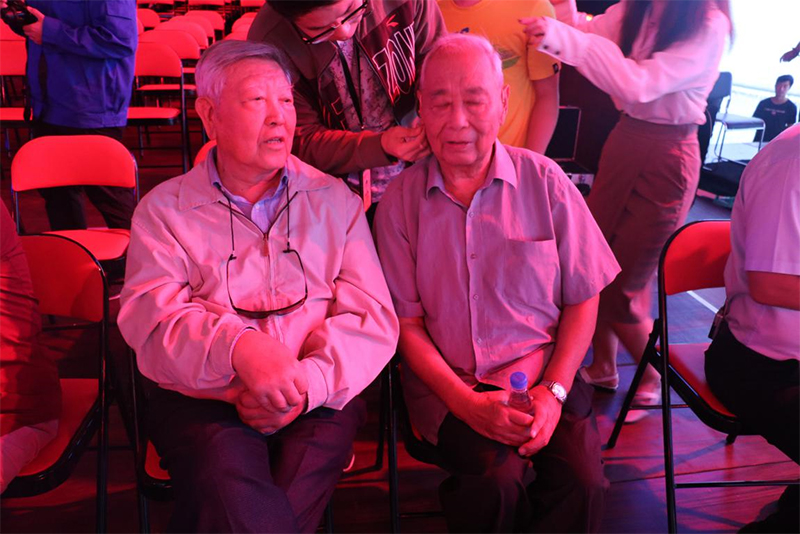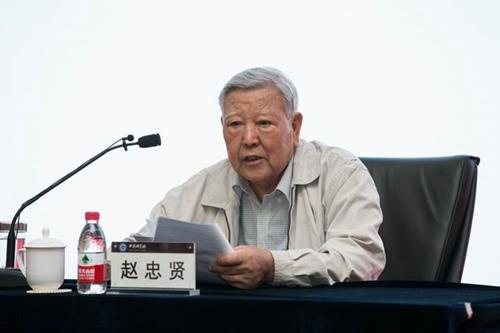Meet the role model ⑦ Zhao Zhongxian: Academician is not cold.

Since 1976, he began to study high critical temperature superconductors, and his name has always been closely related to superconductivity for half a century.
As one of the pioneers who started the research of high-temperature superconductivity in China, he first proposed to explore high-temperature superconductors in China, and first proposed to set up a national superconducting laboratory … … It has made indelible contributions to China’s superconducting development from starting, catching up and being among the forefront of the world when it is 50 years behind.
In the history of superconductivity research for more than a hundred years, there have been two major breakthroughs in high-temperature superconductivity. He and his collaborators have made important achievements, namely, independently discovering high-temperature superconductors in liquid nitrogen temperature region and discovering a series of iron-based high-temperature superconductors above 50K and creating a record of 55 K.
Today, science and technology have a profound impact on the country’s future and destiny. In the field of high-temperature superconductivity, he and his team are constantly attracting groups of young people and pushing China’s high-temperature superconductivity research to the forefront of the world.
He said, "The core science and technology can only be done by ourselves. It is necessary to combine personal interests with the destiny of the country, cooperate in tackling key problems, and serve the country. "
He said, "I would like to be a paving stone and let young friends make great achievements."
He is the winner of the highest national science and technology award in China in 2016, academician of China Academy of Sciences and physicist Zhao Zhongxian.
Sidenote 1: When an old superconducting expert meets an old director of the compilation bureau.
There are four old people among the guests who participated in the recording of "Example" this time. Apart from the special guest Mr. Niu Benlao and a veteran member of the National Survey Team, Mr. Yu Qiqing, who was the first to take part in the Everest survey in China, he is the former director of the Central Compilation Bureau, Mr. Song Shusheng, and academician Zhao Zhongxian, a superconducting expert.
During the filming, Academician Zhao Zhongxian and Mr. Song Shusheng sat together. One of them leaned back thoughtfully, and the other sat upright and had a straight body. I thought that two doyen in different fields would care for each other and sit together as a pair of quiet handsome men, but there was a special dialogue:
"I have read Anti-Turin Theory." Academician Zhao said.
"This book is good, it expounds the three components of Marxism, and it is also relatively easy to read … …” Mr. Song Lao also turned around and began to communicate seriously.
Compared with HTS, a high-cold scientific research topic, the old academician Zhao Zhongxian himself gives people a much more vivid feeling.
He is humorous and honest and frank. From time to time, he uses his loud voice to open the "Tucao" mode, which causes people next to him to laugh. He has a wide range of daily hobbies, and he tries skiing and drifting. Literature, photography, cultural relics in museums and good music in China and the West are all his interests. His heart is firm and soft, with the rigor, strictness and seriousness of scientists, and he always thinks about students and the life and future development of young people.
Under his "independent" face, there is warmth, hope, swallows whispering, and flowers blooming from tree to tree.

Sidenote 2: "Scientific research is like playing mahjong"
When the program was recorded, Academician Zhao Zhongxian was asked: "You have done one thing all your life, and it is something that 99% people in the world don’t understand. How did you persist? " The old gentleman’s spit mode was turned on.
"I think many people don’t understand the fun of scientific research, saying that scientific research is a bench and asking me why I can persist for decades. If you like playing mahjong, do you think you can’t stick to it? " The old man said.
"Scientific research will encounter such difficulties, but just like people playing mahjong, as long as they are interested, they still want to play if they fail, not to mention that we often draw cards, small and big!"
In his mind, the "bench" of scientific research is not always cold. Despite many difficulties, in the process of research, the more you do, the more interested you are. Interest is very important. You are addicted and very willing to do it. At the same time, it is also an encouragement to make new progress in our work. Insisting on doing something has a sublimation of understanding on the basis of long-term accumulation.
In a speech, he mentioned how he became interested in science: in 1956, the state proposed "marching into science." As an imaginative and energetic middle school student, he participated in extracurricular activities of the school physics group and read popular science magazines, which led him to like science. He said: Many years later, I gradually realized that understanding science is a kind of enjoyment, which can gain new knowledge, arouse curiosity and enhance interest.
He was admitted to China University of Science and Technology in 1959. He said that at that time, many students were willing to study science and engineering, which was the call of the state and very fashionable. Popular majors include atomic bombs, semiconductors, etc. "I remember that the cover of the admissions brochure of the University of Science and Technology of China is the rocket. I think it is this that attracted many students, including me, to apply for China University of Science and Technology. It should be said that the call of the country made many people in our generation choose science and technology. "
He said that it is the best choice to combine personal interests with livelihood, and he happened to be very lucky.
Sidenote 3: I think it is very important to settle down and do things.
In the process of chatting with Mr. Niu Ben, when he mentioned some "short and fast" phenomena in the film industry, Mr. Zhao Zhongxian’s tucao mode was opened again:
Now there are so many scientific and technical personnel and teams all over the country. I think it takes a person or a team ten years, or twenty years to solve an important scientific problem or a core technical problem. Does that add up?
He said, don’t be eager for quick success, set a long-term goal. "Now these young people have a good foundation, because their education is very complete, their equipment is world-class and their funds are sufficient. I think the current conditions are very good, and the key is to settle down and do things. "
He believes that "scientific research is a natural and rising process. You have a group of people who have found the right direction and made unremitting efforts in a down-to-earth manner, and will always make discoveries that are beneficial to the progress of human civilization. " As long as all of us can settle down and concentrate on our work, instead of catching up with the "trend" to do things of the same nature, short-term and quick success, our country’s science and technology will develop faster and better.
He said, "I have only done one thing in my life, that is, exploring superconductors and conducting research on superconducting mechanisms. If everyone in our society persists in doing one thing, many problems can be solved. "
Sidenote 4: "Academician Zhao speaks the scientific research party class very well."
During a chat, Academician Zhao Zhongxian chatted, "I have both Chinese and English versions of The Supreme Leader’s Talks on Governing the Country, and some places in the English version are more clear than the Chinese version."
Teacher Dong, the assistant, is sitting on the side. "Academician Zhao speaks the scientific research party class very well."
On July 19th, at the China Academy of Sciences’ theme activity of "Patriotism and Dedication, Being the Pioneer of the Times", Academician Zhao Zhongxian was invited to give a special party class to the delegates.
He talked about the patriotism, dedication, scholarship and self-cultivation of the older generation of scientists, and that after entering China University of Science and Technology, he was inspired by the knowledge and spirit of the older generation, and gradually changed his love for science when he was young into a sense of responsibility and mission in scientific research.
He said that the older generation of scientists taught not only knowledge, but also spirit. In his study and practice, he constantly understood the essence of these famous predecessors’ scholarship, and gradually realized that scientific research needs to take root, and long-term persistence and accumulation will be sublimated in understanding, so as to seize opportunities and accumulate wealth.
He said that his 40-year persistence benefited from the stable environment, and he grew up under the inspiration of the spirit of the old Red Army and the patriotic dedication of the older generation of scientists. The most comforting thing is "I gave".
He hopes that young friends can settle down and concentrate on their work. "One generation does the work of another generation, and several generations of teachers and students cultivate it to realize the rooting of Chinese science." He also believes that they have the ambition and ability to contribute to building a world-class science and technology power and the progress of human civilization.

Sidenote 5: Why can you do one thing all your life?
"I have faith and am interested in science."
During my brief contact with Academician Zhao Zhongxian, the words "faith" and "interest" impressed me the most. These two words have accompanied his life’s choices and supported his scientific research career for decades.
In 1956, the state proposed "marching into science". As an imaginative and energetic middle school student, he took part in extracurricular activities of the school physics group, read popular science magazines, and gradually became fond of science.
In 1959, he was admitted to China University of Science and Technology, and listened to the lectures and reports of famous teachers and the relationship between science and technology and the fate of the country. He began to feel that he was not only fond of science, but also had a sense of responsibility and mission.
In 1972, China Academy of Sciences won more than 20 places to study abroad, and he was selected to go to Cambridge University in England for further study after applying for superconductivity. He enjoys the experimental work of "nine to ten" and is always full of passion. Seeing the gap in contact with international counterparts, he began to move towards the field of high temperature superconductivity.
China, who is in a great hurry, returned to China to lead his team to build their own experimental equipment. The conditions were so hard that he beat mice under the covers. He was still optimistic that his relative disadvantage was not so great. "Compared with other scientific research, the exploration of superconducting materials does not need particularly advanced and complicated instruments. I am willing to make full use of the existing conditions to carry out a project."
After decades of high-temperature superconducting research, he felt the regret that he was beaten to the top by one step, and he also experienced the joy of seizing the opportunity when the international competition was the fiercest. I have experienced the frenzied scene of the "Rock Music Festival in Physics" which lasted for more than 7 hours, and I have also been under great pressure to be questioned because of the many achievements of raw materials and impurities used in experimental samples. Or sit on the bench day after day, or add honor to your success. Between ups and downs, his interest remains, his faith remains, and his "initial heart" has never changed.
For half a century, he has always been interested in and curious about science as a teenager. "Doing scientific research is like playing mahjong," he said. In the research process, despite many difficulties and addiction, the more you do it, the more interested you are and the more willing you are to do it. Just like mahjong clubs and cards, every progress in work is also encouragement. "
Faith is more like a flower in his heart when it is chilly in spring. He said that insisting on doing something will lead to the sublimation of understanding on the basis of long-term accumulation. In day-to-day scientific research, he sees the charming charm of superconductivity, firmly believes that there will be a breakthrough in superconductivity, and firmly believes that his research has great scientific significance and application value, and can contribute to this country, nation and human civilization.
He said that a country’s scientific and technological strength can’t be bought with money, and it can only be based on itself. It is necessary to combine personal interests with the destiny of the country, tackle the problem with teeth, and serve the country with knowledge.